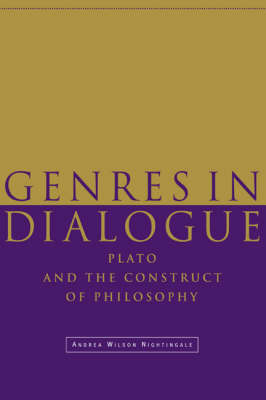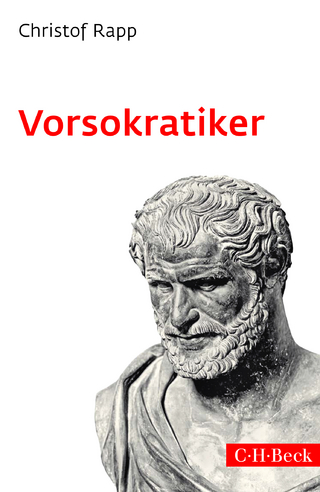
Genres in Dialogue
Plato and the Construct of Philosophy
Seiten
1995
Cambridge University Press (Verlag)
978-0-521-48264-6 (ISBN)
Cambridge University Press (Verlag)
978-0-521-48264-6 (ISBN)
This 1995 study investigates how Plato 'invented' the discipline of philosophy. In order to define and legitimise philosophy, Dr Nightingale maintains, Plato had to match it against genres of discourse that had authority and currency in democratic Athens.
This 1995 book takes as its starting point Plato's incorporation of specific genres of poetry and rhetoric into his dialogues. The author argues that Plato's 'dialogues' with traditional genres are part and parcel of his effort to define 'philosophy'. Before Plato, 'philosophy' designated 'intellectual cultivation' in the broadest sense. When Plato appropriated the term for his own intellectual project, he created a new and specialised discipline. In order to define and legitimise 'philosophy', Plato had to match it against genres of discourse that had authority and currency in democratic Athens. By incorporating the text or discourse of another genre, Plato 'defines' his new brand of wisdom in opposition to traditional modes of thinking and speaking. By targeting individual genres of discourse Plato marks the boundaries of 'philosophy' as a discursive and as a social practice.
This 1995 book takes as its starting point Plato's incorporation of specific genres of poetry and rhetoric into his dialogues. The author argues that Plato's 'dialogues' with traditional genres are part and parcel of his effort to define 'philosophy'. Before Plato, 'philosophy' designated 'intellectual cultivation' in the broadest sense. When Plato appropriated the term for his own intellectual project, he created a new and specialised discipline. In order to define and legitimise 'philosophy', Plato had to match it against genres of discourse that had authority and currency in democratic Athens. By incorporating the text or discourse of another genre, Plato 'defines' his new brand of wisdom in opposition to traditional modes of thinking and speaking. By targeting individual genres of discourse Plato marks the boundaries of 'philosophy' as a discursive and as a social practice.
Acknowledgements; Abbreviations and texts; Introduction; 1. Plato, Isocrates and the property of philosophy; 2. Use and abuse of Athenian tragedy; 3. Eulogy, irony, parody; 4. Alien and authentic discourse; 5. Philosophy and comedy; Conclusion; Bibliography; General index; Index of passages from Plato.
| Erscheint lt. Verlag | 14.12.1995 |
|---|---|
| Verlagsort | Cambridge |
| Sprache | englisch |
| Maße | 164 x 238 mm |
| Gewicht | 530 g |
| Themenwelt | Geisteswissenschaften ► Philosophie ► Philosophie Altertum / Antike |
| ISBN-10 | 0-521-48264-X / 052148264X |
| ISBN-13 | 978-0-521-48264-6 / 9780521482646 |
| Zustand | Neuware |
| Informationen gemäß Produktsicherheitsverordnung (GPSR) | |
| Haben Sie eine Frage zum Produkt? |
Mehr entdecken
aus dem Bereich
aus dem Bereich
mit Sokrates, Seneca, Platon & Co. im Gespräch
Buch | Hardcover (2023)
FinanzBuch Verlag
CHF 25,20


